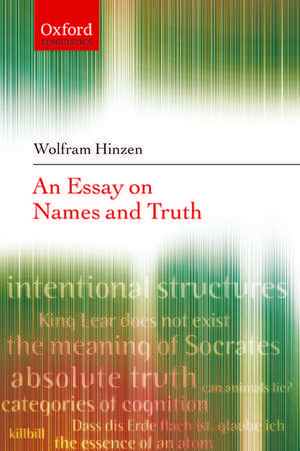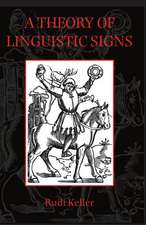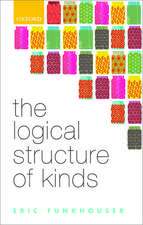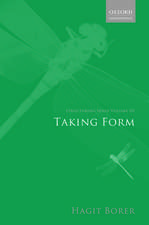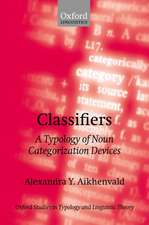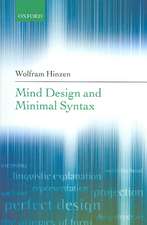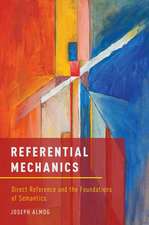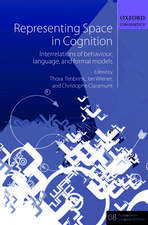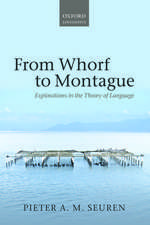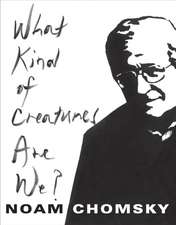An Essay on Names and Truth
Autor Wolfram Hinzenen Limba Engleză Hardback – 11 oct 2007
| Toate formatele și edițiile | Preț | Express |
|---|---|---|
| Paperback (1) | 349.94 lei 31-37 zile | |
| OUP OXFORD – 11 oct 2007 | 349.94 lei 31-37 zile | |
| Hardback (1) | 934.82 lei 31-37 zile | |
| OUP OXFORD – 11 oct 2007 | 934.82 lei 31-37 zile |
Preț: 934.82 lei
Preț vechi: 1197.90 lei
-22% Nou
Puncte Express: 1402
Preț estimativ în valută:
178.87€ • 186.78$ • 147.71£
178.87€ • 186.78$ • 147.71£
Carte tipărită la comandă
Livrare economică 04-10 aprilie
Preluare comenzi: 021 569.72.76
Specificații
ISBN-13: 9780199274420
ISBN-10: 0199274428
Pagini: 254
Dimensiuni: 163 x 241 x 20 mm
Greutate: 0.54 kg
Editura: OUP OXFORD
Colecția OUP Oxford
Locul publicării:Oxford, United Kingdom
ISBN-10: 0199274428
Pagini: 254
Dimensiuni: 163 x 241 x 20 mm
Greutate: 0.54 kg
Editura: OUP OXFORD
Colecția OUP Oxford
Locul publicării:Oxford, United Kingdom
Recenzii
...a well-structured, well written book...
The book marks a signal step in the evolution of generative grammar and the unification of mind and brain. It should command the attention of linguists, philosophers, psychologists and the field of cognitive science.
In this finely crafted essay Hinzen argues that quintessentially semantic notions like Truth and Reference are in fact deeply grounded in natural language syntax. This is nothing less than the beginning of a Copernican revolution in philosophy of language and mind. This should be on everyone's required reading list.
...a book like Hinzen's is welcome...
In Minimal Mind Design, Wolfram Hinzen laid out the philosophical foundations of a minimalist naturalization of meaning. Most philosophers would have been satisfied with that important contribution; Hinzen took it as a mere first step. In this sequel, he embarks on a far-reaching program, aiming at rethinking the old chestnuts of concepts, names and truth within a radically Chomskyan paradigm. I simply do not know of any other work of this scope and profoundness that is as well-versed on current syntactic theorizing.
The book marks a signal step in the evolution of generative grammar and the unification of mind and brain. It should command the attention of linguists, philosophers, psychologists and the field of cognitive science.
In this finely crafted essay Hinzen argues that quintessentially semantic notions like Truth and Reference are in fact deeply grounded in natural language syntax. This is nothing less than the beginning of a Copernican revolution in philosophy of language and mind. This should be on everyone's required reading list.
...a book like Hinzen's is welcome...
In Minimal Mind Design, Wolfram Hinzen laid out the philosophical foundations of a minimalist naturalization of meaning. Most philosophers would have been satisfied with that important contribution; Hinzen took it as a mere first step. In this sequel, he embarks on a far-reaching program, aiming at rethinking the old chestnuts of concepts, names and truth within a radically Chomskyan paradigm. I simply do not know of any other work of this scope and profoundness that is as well-versed on current syntactic theorizing.
Notă biografică
Wolfram Hinzen obtained a PhD from the University of Bern and a Habilitation from the University of Regensburg. He became an Assistant Professor at the Universiteit van Amsterdam in 2003, and Professor of Philosophy of Language at the University of Durham in 2006. His research is broadly placed in the biolinguistic program and addresses issues of grammatical architecture with a view on their implications for human nature and the human mind. His books include Mind Design and Minimal Syntax (OUP, 2006), an edited volume on interdisciplinary perspectives on psycho-physical dualism (published in the journal Erkenntnis), and a volume co-edited with Hans Rott on belief and meaning (Hänsel-Hohenhausen, 2003).
